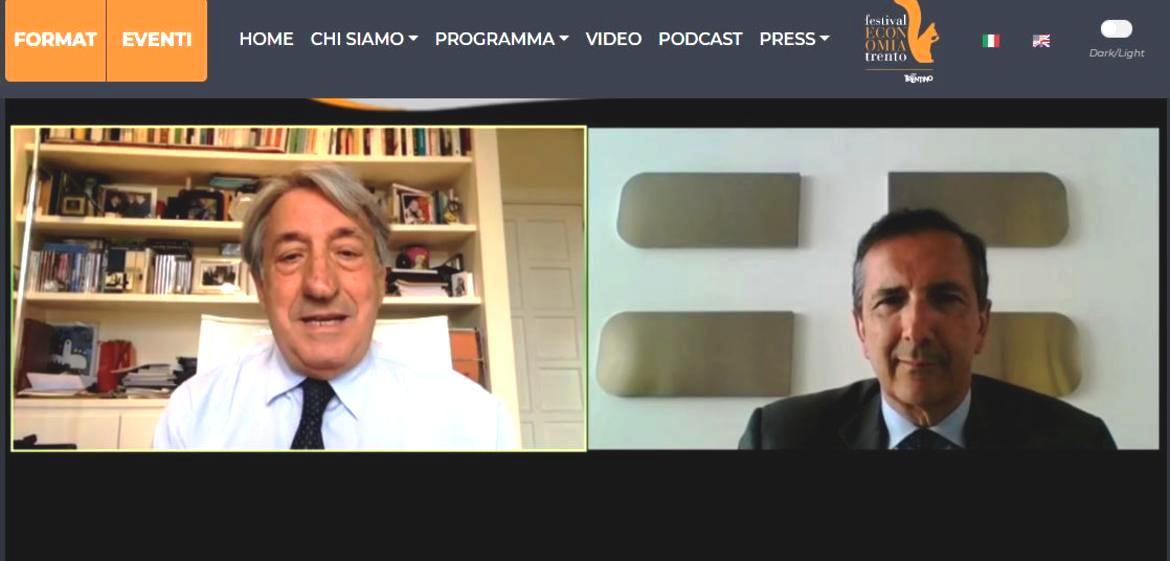
“The period we have just experienced was strange and unusual for Telecom Italia,”, said the CEO of Telecom, responding to Cipolletta’s prompts. “I went to my office in the centre of Rome every morning, meeting practically nobody on the way. It was difficult to forecast what would happen. Of TIM’s 44,000 employees, 9,000 of them, essentially technical staff, continued as before, while the others worked from home. Luckily everything went well, even when the traffic began to increase exponentially”.
As Cipolletta observed, this dramatic experience has effectively had some interesting implications. Above all, it was possible to note that the web held up under the pressure. “And this is very important for our future, because the web is and will increasingly be just as important as road and motorway networks”.
In the future, 5G is on the horizon, with the fifth generation technology standard for cellular networks. The transformation will be similar to that brought by 3G, which enabled the diffusion of social media. “We have successfully passed the test represented by COVID”, Gubitosi continued “but shortly, with 4G we could have problems with data transmission on the web. Traffic is increasing by 30-40% a year. What is more, in Italy we have very modest electromagnetic limits, the lowest in Europe. 5G is much more highly evolved, but it is necessary to create the infrastructure. In the meantime, bizarre ideas are circulating, even the suggestion that 5G networks, which we do not yet have in Italy, favoured the diffusion of Coronavirus. There were similar attitudes to the invention of printing in the 16th century and other major innovations. 5G is in truth fundamental for our country. The network can be developed using fibre, but also towers; there is more than one solution. However, the objective is the same: to make more sophisticated use of data possible, which is another way of describing artificial intelligence. There are many possible applications. Also to combat the diffusion of pandemics”.
4G still guarantees excellent cellphone coverage, with only around 0.5% of the population excluded. As regards landlines, Italy is divided into 3 areas: black areas with good coverage, which often correspond to large urban centres or in any case areas acting as a driving force for the country; grey, intermediate areas, for which new government funding is in the process of arriving; and finally white areas, which concern 25% of the population. They are not just in the south, and they represent a problem. Funding has already been allocated to remedy the situation, but coverage has not yet taken place. Perhaps it will arrive in 2023. One priority for Italy is to bridge this digital divide, which brings other problems with it, in relation to knowledge, education and competitiveness.
COVID-19 has contributed towards extending teleworking, just as other epoch-making events have encouraged the diffusion of other technological solutions and customs. According to Gubitosi, some of this will remain. The workplace will experience a radical decline as a centre for socialisation, at least for a wide range of jobs. We need only think of call centres, places with a high concentration of workers in the telecommunications sector. Teleworking has made it possible to carry out the same tasks remotely, in workers’ own homes. More generally, the increase in the processing power of PCs and other devices will also lead to profound changes in our cities. Peripheral areas, once almost exclusively residential, will also become workplaces. Furthermore, digital technology will increasingly pervade every aspect of society, from education to justice, speeding up processes and increasing performance.
COVID-19 will bring new funding to Italy, representing a major opportunity to improve the country. One thing that is extremely important is the timescale. “It is necessary to act quickly”, Gubitosi explains “just as planning is important. In addition to overcoming the emergency, we must undertake to ensure that the recovery is sustainable. There also needs to be a greater awareness of the opportunities offered by digital technology, at every level. A typical profile for someone not using the web is a person over the age of 50, with a low level of education, living in a small municipality. However, in Italy it is even difficult to promote the widespread use of credit cards. While the country has developed in terms of offer, in terms of demand the problems remain.”
There is an awareness that in any case, Coronavirus has increased use of the web significantly; we need only consider applications such as Zoom, which have experienced spectacular growth. However, now we must keep our foot on the accelerator.
The archive of other live broadcasts is available here: https://2020.festivaleconomia.eu/media








